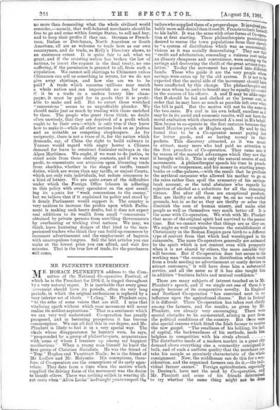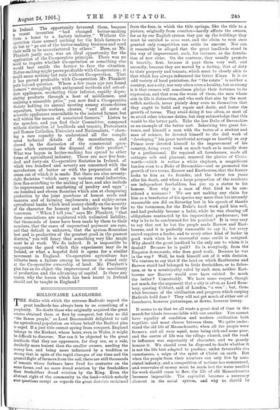MR. PLUNKETT'S EXPERIMENT.
MR. HORACE PLUNKETT'S address to the Com- mittee of the National Co-operative Festival; of which he is.the President for 1901-2, is tinged throughout by a very natural regret. It is inevitable that every great movement should have its periods, often its very long periods, in which the original enthusiasm is replaced by a very- inferior set of ideals. " I cling," Mr. Plunkett says, " to the echo of some voices that are still. I miss that vitalising spark without which your movement Will never realise its noblest aspirations." That is a sentiment which we can very well understand. Co-operation has greatly prospered, and in becoming prosperous it has become commonplace. We can all feel this in our degree, and Mr. Plunkett is likely to feel it in a very special way. The ideals whose disappearance he laments were, he says, "propounded by a group of philanthropists, acquaintance with some of whom I treasure up among my -happiest recollections." • When a young Man himself he knew the first group of Christian Socialists. He was the friend of "Tom" Hughes and Vansittart Neale ; he is the friend of Mr. Ludlow and Mr. Holyoake. His conceptions, there- fore, of Co-operation are the conceptions of its early epos- tolate. • They date from a time when the motive which supplied. the driving force of the movement was the desire to benefit others. There was nothing selfish in wearing ill- cut coats when "Alton Locke ".nadtauglit yonta suspect the. tailors who supplied them of a proper shape. It involvedpra bably more self-denial than it cost St. Francis to limi t hi/11Q to his habit. It was the same with other forms of Co.'opera„ tion at first starting. These philanthropists passionately desired to rescue the town populations from their slava; to " a system of distribution which was as economically vicious as it was soei•illy demoralising." . They saw that "credit and adulteration, concealing a ruinous cost under, an illusory cheapness and convenience, were eating up the savings and destroying the thrift of the great artisan pope. lation." To-day the movement has passed into different hands. Those who guide it are the very people whoa savings were eaten up by the old system. It is not to he expected that the moral side of the movement should We been unaffected by this chana,e The philanthropist and the man whom he seeks to benefit may be equally interested in the success of his efforts. A and B may be alike eager that B should be fed and clothed at the lowest cost, in order that he may have as much as possible left over when the bill is paid. But the motive, will not be the same in the two cases. B's zeal in his own. behalf, excellent as it may be in its social and economic results, will not have the moral exaltation which characterised A's zeal in B's behalf. Men began to co-operate in the first instance because they heard Maurice preach or Hughes speak. By and by they found that to be a Co-operator meant paying less for better goods, and so having money in their pockets. This discovery attracted, as it was meant to attract, many more who had paid no attention to the first • preachers of Co-operation. They came into it by reason of the material advantages which they saw that it brought with it., This is only the natural' course of such movements. A philanthropist spends his time in preach. ing thrift or temperance, and his money in starting penny. banks or coffee-palaces,—with the result that he produces the mythical carpenter who allowed his mother to go on the rates rather than spoil the symmetry of his savings. bank account, or the total abstainer who regards his rejection of alcohol as a substitute for all the remaining virtues. But after all these are exceptional products; Men are thrifty or sober, it may be,.on no very exalted grounds, but in so far as they are thrifty or sober they diminish the sum of human misery, and make other people as well as themselves very much better off: It is the same with Co-operation. We wish with Mr. Plunkett that more of the original spirit had survived to the preient time. But we cannot wonder that things are as they are. We might as well complain because the establishment of Christianity in the Roman Empire gave birth to a different type of convert from that which had worshipped in the catacombs. The more Co-operators generally are animated by the spirit which is not content even with prosperity when it is not shared by others, the more amiable they will become. But if Co-operation does but secure to the workin, man "the economies in distribution which result from a trade needing no advertisement or costly devices to i attract customers," it will have done him a substantial service, and all the more so if it has also taught him in addition "business habits and mutual confidence."
There are many subjects of interest touched on in Kr. Plunkett's speech, and if we single out one of them it is simply because of its comparative novelty. In England and Scotland Co-operation " has exercised next to no influence upon the agricultural classes." But in Ireland it is different. There Co-operation has taken root chiefly among the farmers, and the results, as given by Mr. Plunkett, are already very encouraging. There were special obstacles to he surmounted, arising in part from the political conditions of the country: But there were also special reasons which fitted the Irish farmer to receive the new gospel. " The smallness of his holding, his lack of capital, the backwardness of his methods, made him helpless in competition with his rivals abroad. . . • • - The distributive needs of a modern market in a great city. demand above everything else a commodity consigned in bulk, and of such a uniform quality that the merchant can take his sample as genuinely characteristic of the. whole consignment. Now, the middleman can do this for aeon-. and the organised farmers can do it,—the india vidual farmer cannot. _ Foreign agriculturists, especial in Deninark, have met the need by Co-Operation, and Mr. Plunkett and some of his friends determined to try whether. 'the same thing might not be done
.
Ireland. The opportunity favoured them, because a recent invention " had changed butter-making from a home to a factory industry." Without Co- operation there seemed nothing for the Irish farmers to do but to " go out of the butter-making business and send their-milk to be manufactured by others." Here, as Mr. Plunkett justly says, was an ideal opportunity for the application of the *Co-operative principle. There was no need to inquire whether Co-operation or something else would best enable the farmer to face the situation. Rutter-making might prove profitable with Co-operation ; it could mean nothing but ruin without Co-operation. That it has proved profitable with Co-operation Mr. Plunkett puts beyond question. Where a few years ago you found farmers " struggling with antiquated methods and out-of- data appliances, marketing their inferior, rapidly depre- ciating products through a host of middlemen, and realising a miserable price," you now find a Co-operative Society holding its annual meeting among steam-driven separators, butter-workers, churns, " and all sorts of scientific appliances unavailable to the isolated farmer, but well within the means of associated farmers." Listen to the speeches, and you find their Committee, compose& without distinction of landlords and tenants, Protestants and Roman Catholics, Unionists and Nationalists, " show- ing a rare capacity to understand all the compli- cated technical details of the manufacture, and shrewd in the discussion of the commercial ques- tions which surround the disposal of their product." What was begun in butter-making has spread to other forms of agricultural industry. There are now five hun- dred and forty-six Co-operative Societies in Ireland, of which two hundred and seventy are concerned with the manufacture of butter or with the preparation of the cream out of which it is made. But there are also seventy- eight -Societies "which carry on various rural industries, from flax-scutching to the making of lace, and also include the improvement and marketing of poultry and eggs " ; one hundred and eleven Societies which aim at cheapening production by the joint purchase of honest seeds and manures and of farming implements ; and eighty-seven agricultural banks which lend money chiefly on the security of the character for honesty and industry borne by the borrowers. " When I tell you," says Mr. Plunkett, " that these associations are registered with unlimited that thousands of loans have been made by them to' their members, that the cases of unpunctual payment are rare, and that default is unknown, that the system flourishes best and is productive of the greatest good in the poorest districts," you 'will fancy that something very like magic must' be at work. We do indeed. It is impossible to exaggerate the good which this experiment may do in Ireland, or what a hopeful field it opens for a. similar movement in England. Co-operative agriculture has hitherto been a failure among us because it aimed only at the Co-operative ownership of land. Mr. Plunkett's plan has as its object the improvement of the machinery of production and the advancing of capital. Is there any mason why the lesson which has been learnt in Ireland should not be taught in England ?



































 Previous page
Previous page